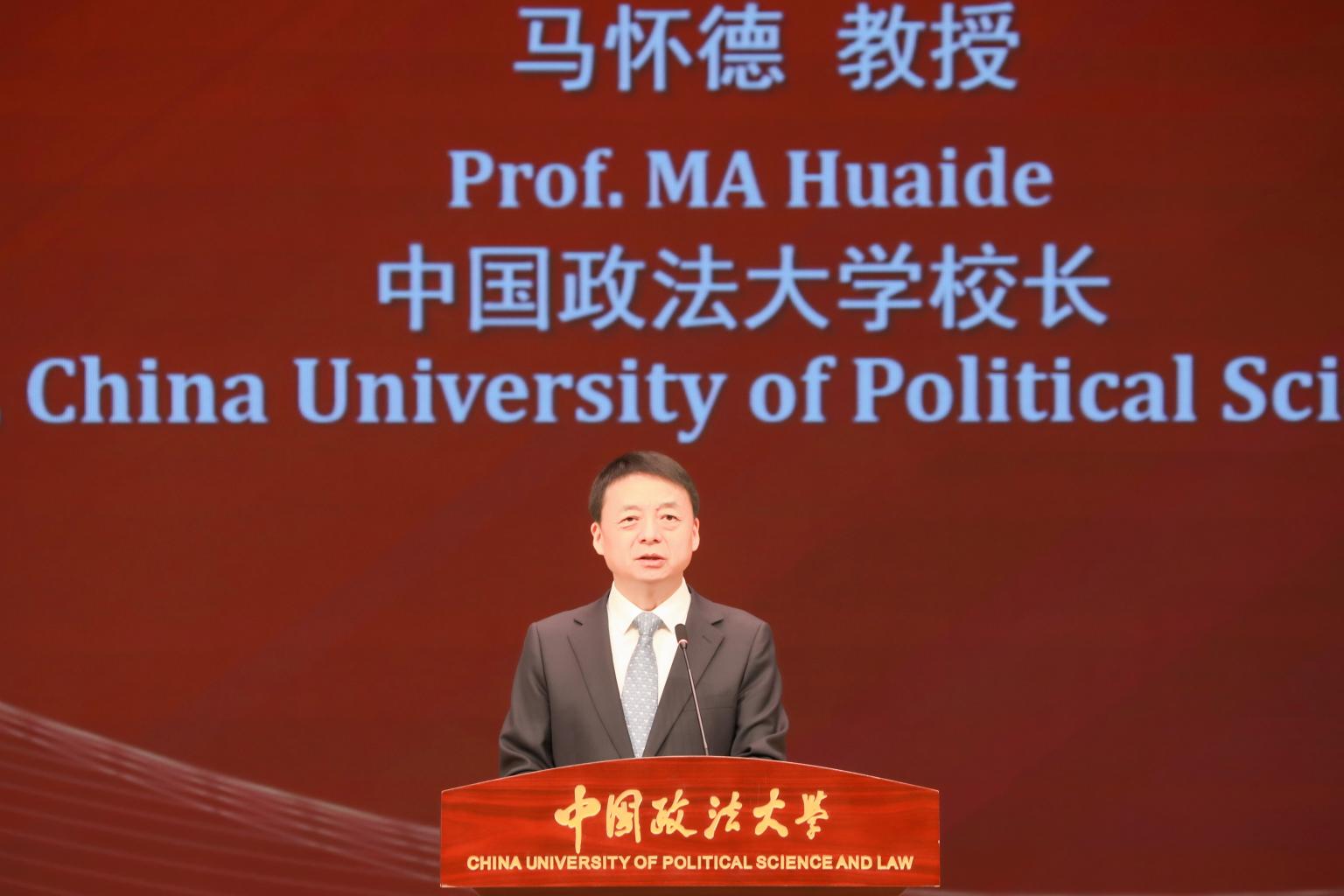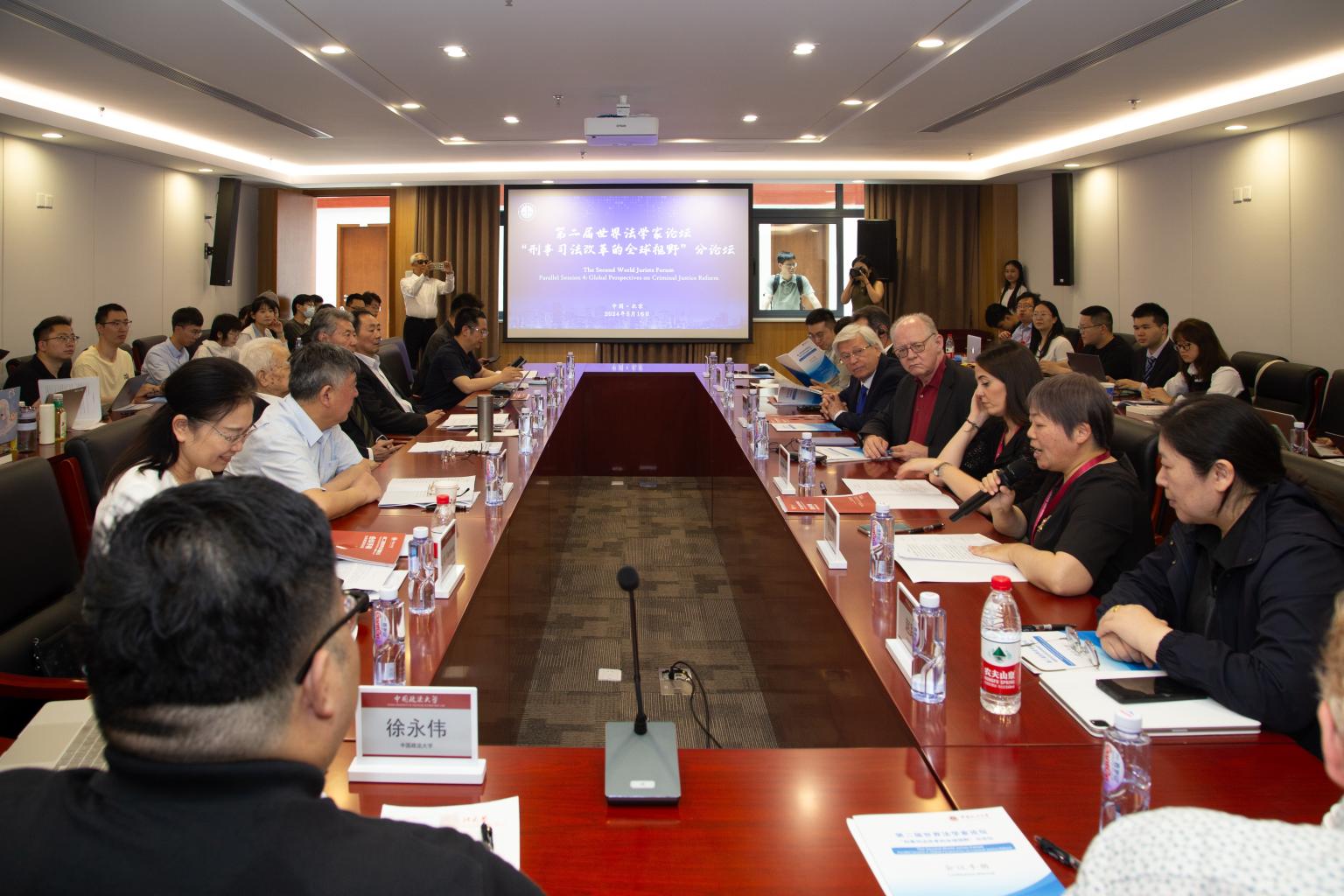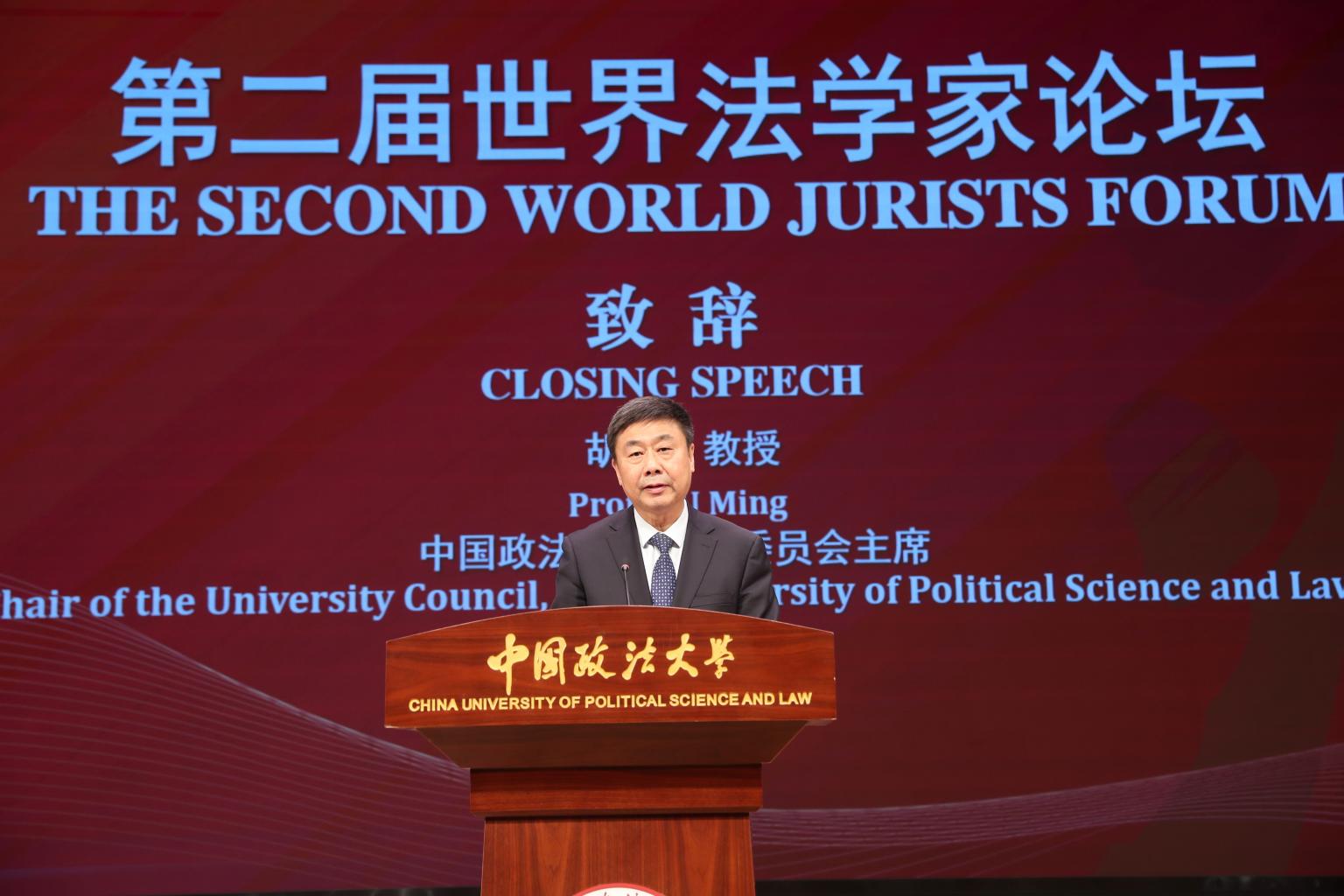On May 16, 2024, the 72nd Anniversary Celebration of China University of Political Science and Law (CUPL), the Second World Jurists Forum was held at CUPL’s Haidian campus. The forum, themed "Legal Education and Research in the Era of Artificial Intelligence (AI)," welcomed 120 experts from around the world, including 60 distinguished speakers such as university presidents, law school deans, notable scholars, and experts from international organizations. They gathered to exchange ideas and have discussions on this theme. This in-person event featured one main forum and six parallel forums.

Opening Remarks
The forum's opening ceremony, held at 9:00 am, was presided over by CUPL Vice President Lu Chunlong. CUPL President Ma Huaide delivered a welcome speech, congratulating the attendees and extending a warm welcome and heartfelt thanks to guests, faculty, and students.
President Ma noted that 2024 marks a pivotal moment for AI development globally, with rapid advancements reshaping production, commerce, education, learning, and social governance. Against this backdrop, the world is confronted with new opportunities and challenges in legal education and research. He emphasized the critical role of legal professionals in navigating the new opportunities and challenges posed by AI. The forum aimed to discuss the impacts of AI on legal education and research, gathering global expertise to address these trends.
President Ma also discussed CUPL's approach to integrating technology into legal education, updating curricula, transforming teaching methods, and adjusting academic standards. He encouraged active participation and idea exchange among the experts and scholars present.
Keynote Speeches
The main forum, presided over by CUPL Vice President Shi Jianzhong, featured keynote speeches from 13 guests representing China, the United States, the United Kingdom, France, Italy, Germany, Brazil, Australia, and Japan.
Zhang Wenxian, Council Member and Director of the Academic Committee, highlighted the need to reform legal education by focusing on intelligentization, institutionalization, internationalization, and the implementation of AI action plans.
James Bacchus, first Chairman of the Appellate Body of the World Trade Organization and Distinguished Professor of Global Affairs at the University of Central Florida in the United States, warned of the risks if AI is monopolized by a few, advocating for reshaping global cooperation to promote sustainable development.
Danièle Bourcier, Senior Researcher at the CNRS, detailed the evolution of AI from "Cognitive Artificial Intelligence" to "Algorithmic Artificial Intelligence" and discussed associated legal risks.
Andrea Carinci, Professor at the University of Bologna, emphasized the transformation of the legal profession and the need for new skills in the digital era.
Marco Haase, Director of the Sino-German Legal Cooperation Program at GIZ, discussed the concept, premises, consequences, and challenges of law as a system of rules.
Mark Wu, Professor of Harvard Law school, addressed the influence of AI on international trade governance and the future adaptation of legal education.
Hamish Stewart, Professor at the University of Toronto, analyzed AI and legal education from a teacher's perspective, citing academic ideas and examples.
Thiago Bottino, Vice Dean at Fundação Getulio Vargas in Brazil, explored AI's impact on legal education with examples like Brazil's VICTOR AI program.
Simon Bronitt, Vice Dean at Sydney Law School, highlighted the need for enhanced AI literacy in legal curricula to prepare lawyers for "smart workplaces."
James Speta, Professor at Northwestern Pritzker School of Law, called for updates to civil liability rules to address the complexities of AI.
Takamizawa Osamu, Professor at the University of Tokyo, emphasized the ongoing importance of multilingual abilities in the AI era.
Volker Roeben, Dean at Durham University, examined the impact of AI on legal higher education from an international law perspective.
Guo Li, Dean at Peking University Law School, discussed the goals of legal education in the AI era, focusing on cultivating students to work effectively with AI.
Experts agreed that AI presents both unprecedented opportunities and significant challenges for legal education and research, underscoring the need for international cooperation.

Parallel Sessions
In the afternoon, six parallel sessions explored topics such as AI and legal theory, legal practice, global criminal justice reform, and the future of legal education. These sessions aimed to foster mutual learning and promote global legal studies.

Closing Remarks
Hu Ming, Chair of CUPL Council, delivered the closing remarks. He emphasized CUPL's commitment to addressing changes in global governance and legal education, highlighting the university's role as a bridge for international cooperation. He praised the forum's achievements in advancing CUPL's educational goals and contributing to global legal education reform.
Council Chair Hu Ming stated that in the process of building a world-class institution of legal education, CUPL has consistently focused on changes in the global governance system and the reform of legal education. The university actively responds to and addresses significant theoretical and practical issues in the field of the rule of law. By strengthening legal education, innovating legal theories, and cultivating talents for the rule of law, CUPL contributes to the construction of a robust legal system.
CUPL plays a pivotal role as a bridge for international cooperation and exchange by regularly hosting the "World Jurists Forum." This event invites experts, scholars, and industry elites from around the world to engage in mutual exchanges, learning, and collaboration.
Council Chair Hu Ming emphasized the vast prospects for global cooperation in legal education. The forum's achievements have further promoted the high-quality development of CUPL's educational mission, deepened reforms, and enhanced the prosperity of legal education worldwide. The forum provided many constructive opinions for judicial organs, education authorities, and relevant decision-making institutions.
He expressed hope that the mechanisms for exchanges and dialogues among world jurists will continue to be consolidated in the future. Leveraging international exchanges to empower talent cultivation, achieving outstanding results through practical cooperation, and fostering the prosperity of legal civilization through the integration of knowledge are essential goals.
Forum Background
The World Jurists Forum is a biennial event hosted by CUPL, dedicated to fostering global exchanges among legal experts and promoting innovation in legal education. The first forum, held in May 2022, focused on "Transformations in Legal Education in the Digital Era," receiving widespread acclaim. 28 Chinese and foreign legal experts from 18 countries and regions in Asia, America, Europe, and Oceania delivered speeches and conducted discussions.
The successful second forum reinforces CUPL's dedication to global cooperation and the promotion of legal education and research in the AI era, contributing to the construction of a community with a shared future for humanity.

